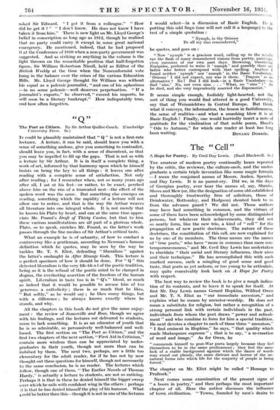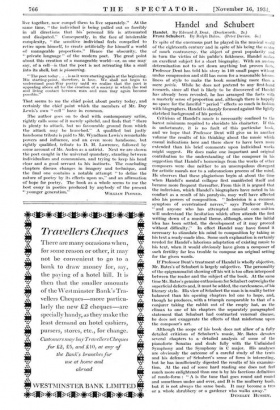The " Cell " A Hope for Poetry. By Cecil
Day Lewis. (Basil Blackwell. Os.) THE amateur of modern poetry continually hears repeated by the critic, the reviewer, the culture-snob, and the under-
graduate a certain triple invocation like some magic formula —I mean the conjoined names of Messrs. Auden, Spender, and Day Lewis. It is no parrot-cry. Did we, in the days
of Georgian poetry, ever hear the names of, say, Shanks, Shove and Mew (or, like the designation of some old-established and thoroughly trustworthy firm of solicitors, those of Drinkwater, Bottomley, and Hodgson) shouted back to us from the advance guard ? We did not. Those authors may have had something in common, and the virtues of some of them have been acknowledged by some distinguished persons, but whatever their achievements, they did not so neatly form, like the new trio, a kind of " cell " for the propagation of new poetic doctrines. The nature of these doctrines, the constitution of this cell, are now explained for us by one of its members. The three names are the names of "true poets," who have "more in common than mere con-
temporaneousness," and Mr. Cecil Day Lewis has undertaken to elucidate " their social and literary influences, their aims and their technique." He has accomplished this with such marked success, such a mingling of good sense and good taste, that poets as yet unborn, or too young to be articulate, may quite conceivably look back on A Hope for Poetry with respect.
The best way to review the book is to give a rough indica- tion of its contents, and to leave it to speak for itself. At first Mr. Day Lewis names Gerard Hopkins, Wilfred Owen and Mr. T. S. Eliot as " our immediate ancestors," and explains what he means by ancestor-worship. He does not mean a substitute for religion, but rather a recognition of a strong personal link with certain individuals in the past, individuals from whom the poet draws " power and refresh- ment " and who combine to form for him a special tradition. He next devotes a chapter to each of these three " ancestors." " I find eminent in Hopkins," he says, " that quality which made Shakespeare supreme " ; that is to say, " a re-creation of word and image." As for Owen, he
" commends himself to post-War poets largely because they feel themselves -to be in the same predicament ; they feel the same lack of a stable background against which the dance of words may stand out plainly, the same distrust and horror of the un- natural forms into which life for the majority of people is being forced."
The chapter on Mr. Eliot might be called " Homage to Prufrock."
Next • comes some examination of the present signs of " a boom in poetry," and then' perhaPs the most important chapter of all. Here the author discusses the influence of town civilization. " Towns, founded by men's desire to live together, now compel them to live separately." At the same time, " the individual is being pulled out so forcibly in all directions that his personal life is attenuated and dissipated." Consequently, in the face of intolerable cornplexity, " the sensitive individual feels compelled to retire upon himself, to create artificially for himself a world of- manageable proportions." Hence the obscurity, the
private language " of the modern poet. The great point about this creation of a manageable world—or, as one may say, of a cell—is that the poet is not retreating like a snail into its shell, but is pioneering.
" The poet today . . . is as it were starting again at the beginning. His starting-point, therefore, is love. We shall not begin to understand post-War poetry until we realize that the poet is appealing above all for the creation of a society iri which the real and living contact between man and man may again become possible."
That seems to me the chief point about poetry today, and certainly the chief point which the members of Mr. Day Lewis's own " cell " have in common.
The author goes on to deal with contemporary satire, rightly calls some of it merely spiteful, and finds that " there is plenty to attack, but no favourable ground from which the attack may be launched." A qualified but justly handsome tribute is paid to Mr. Wyndham Lewis's remarkable powers and influence, and an even more handsome, but rightly qualified, tribute to D. H. Lawrence, followed by some account of Mr. Auden as a satirist. Next we are shown the poet caught in the universal quandary, standing between individualism and communism, and trying to keep his head clear and a good servant to his instincts. The concluding chapters discuss changes in imagery and technique, and the final one contains a notable attempt " to define the nature of poetry by its effects upon us," and an affirmation of hope for poetry. The book as a whole seems to me the best essay in poetics produced by anybody of the present
younger generation."
WILLIA31 PLOMER.







































 Previous page
Previous page